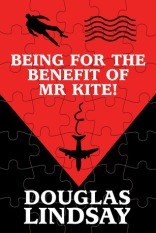My latest review, included in the just-released Crime Factory issue #16–the excellent Being for the Benefit of Mr. Kite! by Douglas Lindsay. Enjoy, coffee drinkers and Beatles lovers!
Before Douglas Lindsay’s Being for the Benefit of Mr. Kite! descends into nightmare, the narrative hints at a story about the ho-hum life: the humorous musings of a middle-aged man resigned to a tired marriage, an uninspired job, and a sense that the only bright spot on his horizon is his intelligent daughter, Baggins. But the ennui is transformed by a surprise phone call from James Kite’s literary agent. A Hollywood mogul wants to produce his screenplay, The Jigsaw Man, which had languished for years on slush piles around the world.
That should resonate with anyone who’s sent their manuscripts off to editors, only to have the pages disappear without a trace. For Kite, however, the revival of his script—“Exactly the type of straight-to-TV, martial arts bunfight that would be turned into a Steven Segal movie and shown in the late hours on Channel 5,” as he describes it—is received with disbelief and doubt rather than hope or joy. It can’t be real. As his wife Brin says: “It’s from Hollywood. Of course it’s fake.”
And so much of what follows can’t be real, either. Kite vanishes from a plane bound for Hollywood. The narrative next has him trapped in a dull grey cell inside a secretive American institution. He has no recollection or understanding of how he got there, let alone where there is. All he knows is that two humorless American agents, Crosskill and No-Name, want to know how he got off the plane, and the whereabouts of the Jigsaw Man. Queue Kite’s confusion—do they want the man or the script inspired by the man?—in the face of these stone-faced manifestations of bureaucracy.
Kite’s predicament forces us to ask: what might it be like to find oneself dressed in an orange jumpsuit, shackled to the floor behind a chain-link fence in Guantanamo Bay? Kite knows about as much of his circumstances as many of the Afghanis swept off the battlefield after 9/11 knew the whereabouts of Osama bin Laden or his plans for future attacks. Kite’s circumstances universalize their plight: Kite doesn’t know what happened to the plane; the reader knows Kite doesn’t know; and we can’t help but feel the helplessness of men trapped in a situation over which they have no control and no hope of escape. If this could happen to ho-hum Kite, Starbucks manager by day, failed writer by night, it could happen to any of us.
Lindsay is smarter than to make this a book about 9/11 and the ignorant cruelty of governments in fervent pursuit of “truth” in the name of “security.” Like “war,” this pursuit’s been with us since before the Inquisition, and I can’t help but recall Slaughterhouse-Five: “Do you know what I say to people when I hear they’re writing anti-war books?… I say, ‘Why don’t you write an anti-glacier book instead?’”
Lindsay’s surreal world isn’t the kind of thing I normally enjoy in fiction. Reality can be strange enough without speculating on the implausible: a psychic leap off a crashing plane; a second self residing in time six months behind the original self, whose life continues apace. But Lindsay manages to make his speculations work, even this: human manifestations of the greatest works of art (and pop culture!) resulting in, for example, four versions of the man who may or may not be the fifth Beatle. Yes, in the hands of most writers this set-up would be a recipe for really bad television about zombies. But Lindsay takes this concept and applies it, as I suggest at the outset, to the most ordinary, workaday life of one ordinary, workaday daddy stuck in the present while feeling guilty over unfinished business with Jones, a lover from deep in his past.
The book works because Kite and Jones, No-Name and Crosskill—even the elusive Jigsaw Man—are imbued with the necessary humanity. Prepare to fall in love again with the Beatles, and to learn which one was the coolest. Prepare for great irony: Paul is dead? Sure, you’re thinking, I know. I saw him die at the Olympic opening ceremony. However, the man who made us all suffer through “hey Jude” that warm London night in July, was not the man who exploded onto the music scene with the Beatles in the early 1960s. Prepare, most of all, for a nightmare that’s all the more frightening because it’s real.
Being for the Benefit of Mr. Kite!
By Douglas Lindsay
Blasted Heath, 2014
